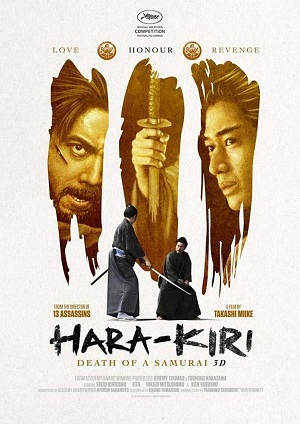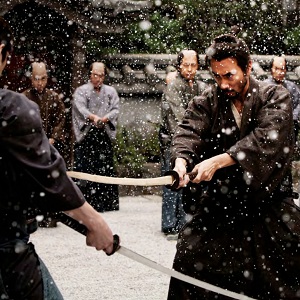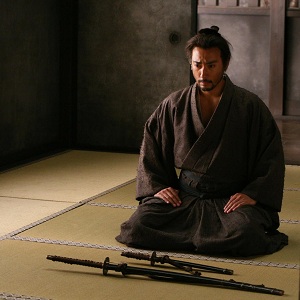Blu Review: Hara-Kiri: Death of a Samurai (2011)
 Cast: Kôji Yakusho, Naoto Takenaka, Eita
Cast: Kôji Yakusho, Naoto Takenaka, Eita
Director: Takashi Miike
Country: Japan | UK
Genre: Drama
Official Trailer: Here
Video codec: MPEG-4 AVC
Video resolution: 1080p
Original aspect ratio: 2.39:1
Japanese: DTS-HD Master Audio 5.1
Editor’s Notes: Hara-Kiri: Death of a Samurai releases on Blu Ray from New Video Group on January 22nd.
Takashi Miike’s Hara-Kiri: Death of a Samurai is an oft grizzly, yet surprisingly restrained remake of Masaki Kobayashi’s 1962 masterpiece (Harakiri) that illustrates the timeless nature of the tale and the perennially dehumanizing effects of ritual and bureaucracy. Miike’s version of the tale highlights the whitewashed façade of slapdash nobility that barely conceals the shame and injustice that has forever stained the stone courtyard and imprinted itself in the hearts and minds of the feudal lords that oversee it. It is a tale that illustrates the monumental futility in engaging in social reform, particularly within the caste systems of 17th century feudal Japan that valued honor and proprietary over human life and empathy. It would take the blood of pitifully noble and desperately brave men to set changes in attitude in motion, but these battles will continue to be fought for the duration of human existence as injustice has the tendency to find fertile breeding grounds under every system of government that values its own axioms and mechanisms over human life.
Miike’s version of the tale highlights the whitewashed façade of slapdash nobility that barely conceals the shame and injustice that has forever stained the stone courtyard and imprinted itself in the hearts and minds of the feudal lords that oversee it.
 Lacking the inherent shadows and light of Kobayashi’s black-and-white photography, Miike instead uses his feudal palaces as canvases to exhibit the careworn imperfections and grit that deconstruct the myth that feudal Japan was beyond reproach for its carefully planned spaces and elaborate rituals that ultimately masked the abhorrent poverty of those unlucky enough to be born in one of the lower classes. Old paint bleeds through the new if not carefully applied, just as antiquated dehumanizing attitudes bled through the face of each reactionary lord as they find themselves incapable of even the most basic empathy. The frayed threads of a ronin’s garb and his unshaven face betray the myth of irreproachable civility in an era with axiomatic rules on suicide and haircuts, and his pitiable story reveals the extent of human suffering that had been masked by unquestioned rituals and ironic propriety.
Lacking the inherent shadows and light of Kobayashi’s black-and-white photography, Miike instead uses his feudal palaces as canvases to exhibit the careworn imperfections and grit that deconstruct the myth that feudal Japan was beyond reproach for its carefully planned spaces and elaborate rituals that ultimately masked the abhorrent poverty of those unlucky enough to be born in one of the lower classes. Old paint bleeds through the new if not carefully applied, just as antiquated dehumanizing attitudes bled through the face of each reactionary lord as they find themselves incapable of even the most basic empathy. The frayed threads of a ronin’s garb and his unshaven face betray the myth of irreproachable civility in an era with axiomatic rules on suicide and haircuts, and his pitiable story reveals the extent of human suffering that had been masked by unquestioned rituals and ironic propriety.
Miike shows great restraint in his retelling of this classic samurai tale, allowing us in one scene to stare uncomfortably into the face of a pitiful man as he disembowels himself with a bamboo sword, while in other scenes taking the time to reflect on the changing of the leaves as both seasons and prevailing attitudes of a culture are equally transient. The delicacies of feudal lords are shown in repulsive detail as they are slurped down in a perfunctory ceremony of privileged boredom, contrasted with the meager meals of the lower class citizens as only the hungry are capable of understanding the real value of food, and only the poor can see the utilitarian beauty found in threadbare clothing. He allows objects and people to occupy spaces with purposeful reverence illustrating that social reform is often best carried out from within a system, even if that system is inherently unfair, and that such changes are practically imperceptible but inevitable as long as there are families forced to tragic ends by inescapable desperation.
He allows objects and people to occupy spaces with purposeful reverence illustrating that social reform is often best carried out from within a system, even if that system is inherently unfair
 What surely was a grand spectacle in a theatrical 3D setting, this Blu Ray presentation from New Video Group does a marvelous job of capturing the vibrancy of leaves as they change in color, the lush greens of an impoverished countryside, and the superfluous perfection of the stones in the lordship’s courtyard as it is forever tarnished by the blood of the desperately destitute. While incomparable to Kobayashi’s 1962 masterpiece, Miike’s adaptation illustrates the timeless nature of humanity’s mitigation of personal responsibility for the plight of others through ritual and propriety, the universal appeal of subverting an unjust system using its own rules, and the false romance of bygone eras and outmoded ideals. Miike utilizes his own strengths to create a powerful and affecting drama that shows the ferocious audacity of one man that with nothing more than a simple bamboo blade bests every man in the courtyard and illustrates the irreproachability of divine justice carried out with sacrosanct honor.
What surely was a grand spectacle in a theatrical 3D setting, this Blu Ray presentation from New Video Group does a marvelous job of capturing the vibrancy of leaves as they change in color, the lush greens of an impoverished countryside, and the superfluous perfection of the stones in the lordship’s courtyard as it is forever tarnished by the blood of the desperately destitute. While incomparable to Kobayashi’s 1962 masterpiece, Miike’s adaptation illustrates the timeless nature of humanity’s mitigation of personal responsibility for the plight of others through ritual and propriety, the universal appeal of subverting an unjust system using its own rules, and the false romance of bygone eras and outmoded ideals. Miike utilizes his own strengths to create a powerful and affecting drama that shows the ferocious audacity of one man that with nothing more than a simple bamboo blade bests every man in the courtyard and illustrates the irreproachability of divine justice carried out with sacrosanct honor.
-
http://www.facebook.com/shari.begood Sharon Ballon






















 Blu Review: Badlands (1973)
Blu Review: Badlands (1973) Review: Room 237 (2012)
Review: Room 237 (2012) SXSW Review: A Teacher (2013)
SXSW Review: A Teacher (2013) Review: The Incredible Burt Wonderstone (2013)
Review: The Incredible Burt Wonderstone (2013) Review: Spring Breakers (2012)
Review: Spring Breakers (2012)



